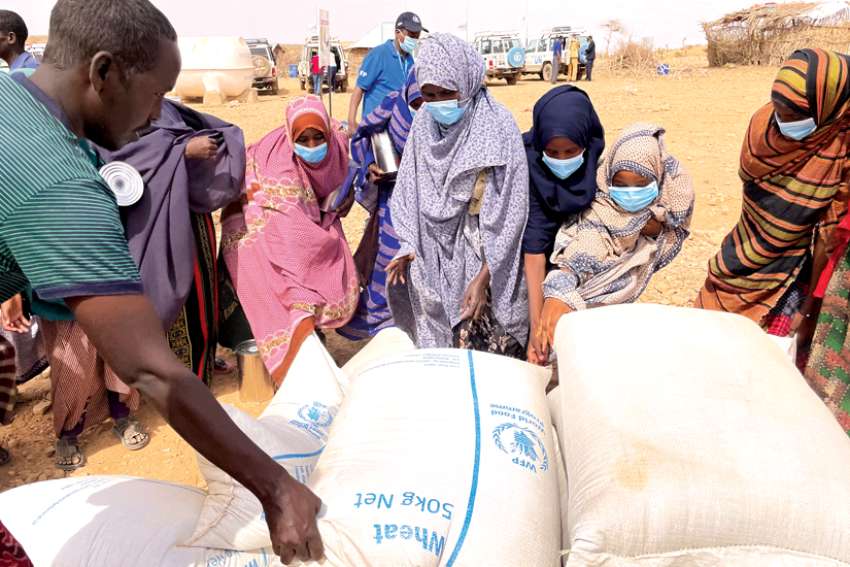Fantu is the Ethiopia director of CNEWA (Catholic Near East Welfare Association), a papal agency that supports the humanitarian and pastoral work of Eastern churches, and is the lifeline for the poor throughout the Middle East, Northern Africa, India and Eastern Europe.
CNEWA serves a number of Catholic jurisdictions in Ethiopia, where nearly 68 per cent of the country is Christian. In the northern region of Tigray about 96 per cent of the population are Ethiopian Orthodox Christians with Catholics comprising a small minority.
Fantu and his co-workers are eyewitnesses to a humanitarian catastrophe that has reached alarming proportions in Ethiopia, a country on the margins of the world media’s attention which has been dominated for nearly three years by COVID-19 and subsequently the Ukraine war.
“It’s a conflict that remains largely unknown to Canadians,” he pointed out.
Since Nov. 4, 2020, when tensions between Ethiopia’s federal government and the leaders of Tigray erupted into armed conflict, priests and religious sisters who work with CNEWA have been witnessing the suffering of victims on a daily basis, he said.
“Hearing the groans and cries of malnourished babies and children is gut-wrenching, while their mothers look on — with no other choice but to watch them slowly go,” Fantu said. “There is simply not enough medicine or food. Even powdered milk is unavailable.”
Russia’s invasion of Ukraine in February has triggered a global shortage of food, which has had a particularly severe impact on this region, while the astronomical price of gas makes it difficult for humanitarian workers to reach the most vulnerable with essential supplies.
Asked to give concrete examples of how the Ukraine war is affecting people in Tigray, Fantu said: “The Ukraine war has surely intensified the suffering of people not only in Tigray but all over the country. However, people in Tigray suffer from multiple effects. The Ukraine war caused a sharp increase in oil and gas prices. Ethiopia heavily depends on imported oil. Oil is very important for all means of transportation and transporting either local agricultural products to markets or imported commodities from the port of Djibouti in the east to distribution and market points.”
Fantu points to early July when the price of diesel fuel increased by 38 per cent while benzene climbed by 30 per cent.
“The effect of this is an increase in all consumer products and commodities. Teff, (the ancient grain used to make the flat bread called injera, the staple of Ethiopians’ diet) was $66.92 (U.S.) per 100 kg, but now it is more than $95.60 (U.S.) In Tigray, I was told it is more than $286.80 (U.S.) With a shortage of local currency in Tigray, who can afford it?”
The United Nations has had to step up efforts to get food supplies to the people.
“Food distribution is mostly through the World Food Program because of security concerns and shortages of fuel,” he said.
But despite all these challenges, CNEWA works with Church partners from the Ethiopian Catholic Church to provide emergency relief to remote places in a land where war and starvation are making life unbearable for millions.
Fantu cited the example of Sr. Marina Chufamo, a nun who belongs to the Daughters of the Charity of St. Vincent de Paul. She was helping people in Mekelle (capital of Tigray) for more than a year. She recently told Fantu that “some shelters in Mekelle are overwhelmed by young mothers who managed to travel from remote areas to the city, and are in a life-or-death situation with three or four children looking for food. They have no idea where their husbands are.”
Sr. Hiwot, provincial Superior of the Daughters of Charity of St. Vincent de Paul, after visiting the Mekelle and Maichew areas, appealed to CNEWA for emergency food aid support for displaced mothers and children under their care.
“We accompany those religious sisters who serve the Church as ‘foot soldiers’ and who support the desperate and needy people. We also accompany priests in their respective remote parishes, who bring hope to the suffering people. CNEWA transfers funds to purchase some food items at local markets for distribution to people in need, or we make cash distributions to very poor families in distress,” said Fantu.
While “such support may seem small to us,” he said, “it has a lifesaving impact on these families. It gives a little sigh of relief to the sisters and the priests, as well as to the beneficiaries. CNEWA in its mission accompanies the Church to affirm human dignity and alleviate poverty with humanitarian assistance.”
Fantu is grateful for the support from Canadians in the past, but more is needed.
“We need prayerful accompaniment from the Canadian people to end the war in Ethiopia.”


